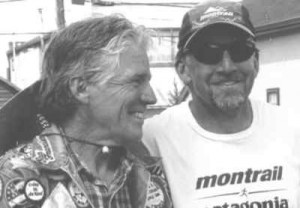Essay by Lissa James
Silviculture – February 2005 – Colorado Central Magazine
My family owns a timber company in Washington state, and for us, money grows on trees.
Every time we buy something, we see the physical signs of our consumption in our backyard. Paying for my recent college education, for example, took about 300 log truckloads of second-growth Douglas fir, cedar and hemlock trees. A $60 pair of jeans equals a log of doug fir that’s eight inches at the top and 36 feet long. When we pay medical bills or leave our town of 200 to go on vacation, we cut more trees.
I grew up on the timber farm, which is owned by some 30 members of my mother’s extended family. Some of them work for the family company on the Olympic Peninsula, operating chain saws and laying out clear-cuts; others work as interior designers in Chicago or as wine importers in New York City.
Not everyone approves of the family business. One of my relatives, for instance, called the company’s timber income “blood money.” But for the most part we get along and enjoy each other when we gather in Washington to talk about log prices, sustained yield and board footage.
A surefire bet for a heated family debate, though, is the question of how we should manage Grandfather’s Park, 18 acres of river bottomland that the family removed from timber harvest in the 1970s. Homesteaders logged the park with oxen in 1880, 20 years before my family bought the land, so it’s not the “virgin” old growth visitors often mistake it for. But now the trees are huge again — covered in moss, footed with sword fern and, when it’s sunny, lit by golden-green light.
For decades, my uncle, the farm’s current manager, harvested a load or two of dead and dying trees from the park each year, which earns us about $2,000 a load. But this year, some family members got together and petitioned to stop any logging of the old trees. Immediately, another group formed, and it argued that ending salvage logging in the park would be a symbolic first step towards destroying our timber company.
The debate wasn’t over ecology and economics but about underlying philosophies — whether or not it made us “better” people to stop the salvage logging. But this wasn’t a philosophical exercise. The argument began through mass emails and quickly became ugly and personal, sprinkled with decades-old quotes dredged up from the family’s collective memory. During the meeting the anti-loggers shed tears and made emotional speeches, while other family members signed petitions, conducted biased surveys, sat in awkward silence and occasionally shouted. I mostly listened.
The people who wanted to stop salvage logging accused their opponents of being greedy, out-of-touch and totalitarian. The pro-salvage logging team retorted that the “greeners” were wealthy, out-of-touch and manipulative.
Each side resorted to cliches. The “environmentalist” cousins acted as if a human presence automatically ruined a forest; the “anti-environmentalist” group acted as if trees were only good for human consumption.
I know that neither group is actually that narrow-minded. But they were both afraid that any compromise would lead to total surrender. In the end, however, there simply weren’t enough stakeholders for this to be a never-ending battle, as it is with the Forest Service.
After a couple of hours, the people in my mother’s generation put together what was generally considered to be a win-win resolution. They created a park committee, consisting of two moderate representatives from both camps, which will be in charge of deciding when and how we salvage-log. I think it’s a face-saver more than anything. Grandfather’s Park is still open to salvage logging, but it may be years — if ever — before the next load of dying trees is taken out.
While it was painful and depressing to watch my family argue, the meeting wasn’t discouraging. Most of the young people at the meeting saw past the hullabaloo and agreed with both points of view. It might just be because we’re younger. Maybe as you age you simplify the world around you in order to stay sane. Or maybe we chose the middle path simply because we didn’t want to offend anyone.
I prefer to think that my 20-something generation learned something from our parents. I prefer to think of us as “green loggers” who have moved beyond the black-and-white environmental vision that’s been passed down to us. Most of all, I hope that when the time comes for us to call the shots, we’ll be able to trust each other.
Lissa James is a contributor to Writers on the Range, a service of High Country News in Paonia, Colorado. She just concluded an internship with the paper and is heading back to Washington to work in the family business.


